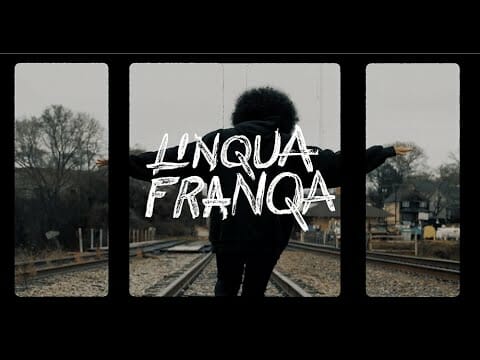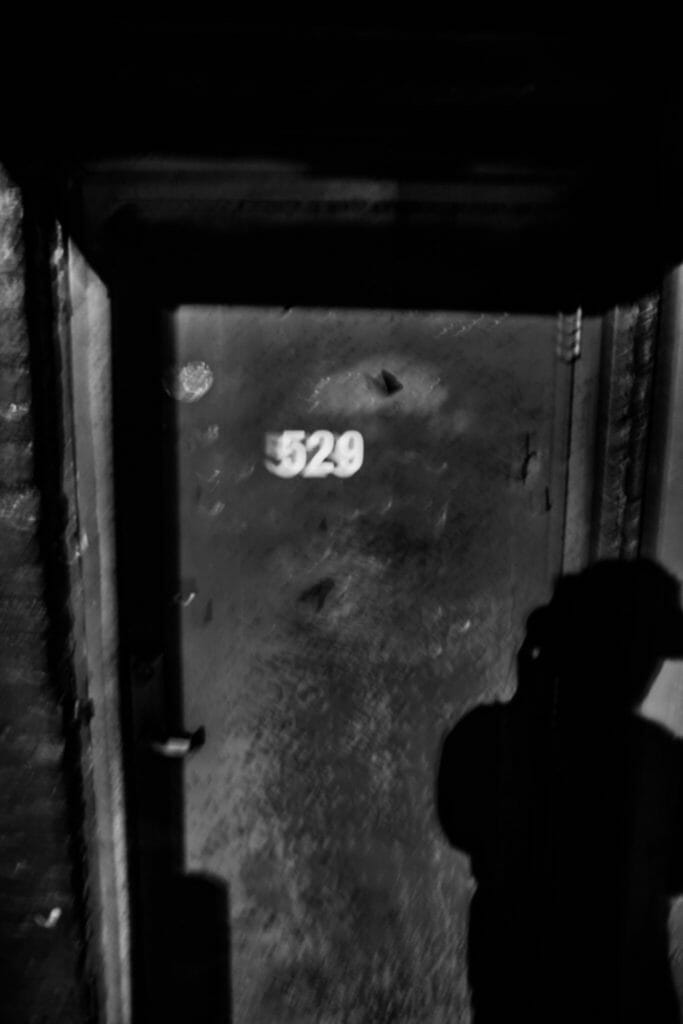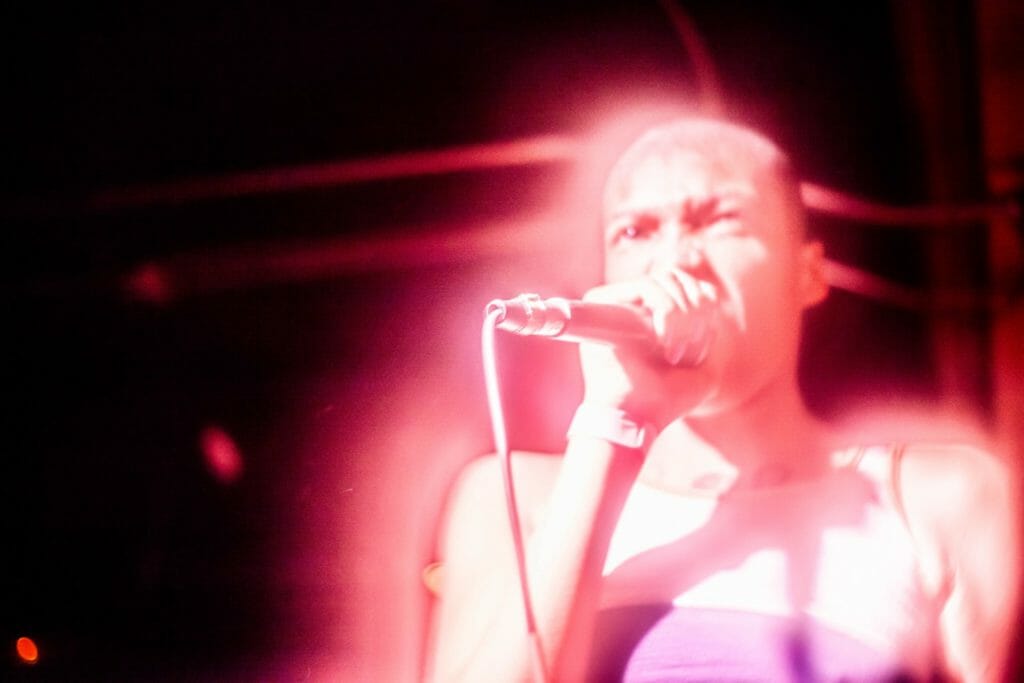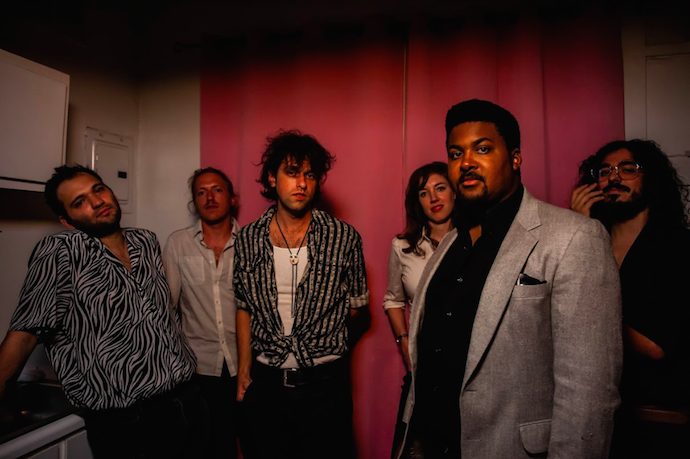“If being radical is grasping from the root, that’s just what I’ll do.
That’s just what I’ll do.Defund the CIA and the cops and the pentagon,
Make ’em raise they money with a telethon,
They racism that makes ’em sick is set in stone, so send ’em off
Spend a billion on keeping our people housed and showered,
An allowance in our pouch and all our kitchen fridges stocked,
And you won’t have to spend a dime keeping ’em prison locked,
I really don’t understand what makes this decision hard.”
— Linqua Franqa, “Abolition”
Athens-based rapper and hip-hop artist Linqua Franqa (otherwise known as organizer and city council commissioner Mariah Parker) delivers their second full-length album, Bellringer (released April 22 via Ernest Jenning Record Co.)—a stacked record with back-to-back bangers produced by DJ Reindeer Games and featuring artists Jeff Rosenstock, Dope Knife, of Montreal, Pip the Pansy, Night Palace, Four Eyes, Kishi Bashi, and WesdaRuler. The album’s closer, “Abolition,” also features a conversation between Parker and renowned prison abolitionist organizer Angela Davis. The album’s singles, “Wurk,” “Oh Fxck,” and the title track have all been released with accompanying music videos directed by Atlanta-based filmmaker Nolan Huber-Rhoades.
The album begins and ends with the 1992 murder of Black 16-year-old Latasha Harlins, spanning and digging into the conditions of the racist capitalist system that made Harlins’ and many others’ deaths possible. Each track grapples with a different element of conditions we face, whether as individuals or as a collective, internal or external. Bellringer rides on the tightrope of what’s personal and what’s political, battling the old world with the new, circumventing the tension that exists between worlds of dismantling and reimagining.
Linqua begins with the overture and title track as odes to Harlins, bringing us to the intersection of racist, patriarchal capitalism and trauma. These kick the rest of the album off into a time warp to present day, showing us how, in some ways, our outer world has changed. In “Sometimes I Hate This Town,” Linqua and Dope Knife describe the mental tolls of being too online, arguments with Twitter trolls, and the toxicity of going viral. But when the album brings listeners inward, again, the lyrics showcase how much has remained the same. In “Growth II,” Linqua grapples with the paradoxes of their internal experience carrying the weight of a dehumanizing system while doing all they can to abolish that system, whether from inside-out or outside-in.
While each song represents a fragment of the human condition, the album itself embodies a sense of wholeness through these individual confrontations. Linqua knows this means both never balking at their own shadow while embracing their other complexities, too. The album’s third single, “Oh Fxck,” carries a hook and chant mesmerizing in the ideas of self-love and collective love, throwing away the book on boundaries (and binaries), and instead embracing the notion that love is boundless. Standout track “Wurk,” the album’s first single and impromptu addition to the album, is a call to arms for workers across the nation to claim their power back through collective bargaining and a return to optimism over doomerism.
Parker joined me earlier this week to discuss the album more in-depth. Read on for a featured transcription and join us our Patreon for the full listen as well as other exclusive content.
Aja Arnold: How do you feel about the album since it’s come out and since you started working on it?
Mariah Parker: I’ve been working on it since 2019 and finished recording it when I was eight months pregnant last summer. And the day that it finally was here, it was terrifying actually, because I had sat with and processed and reclaimed a lot of these difficult experiences from dehumanizing logics. But then I was like, “Oh shit. I can’t control what happens now.” People are going to take this and run with it in any direction they want. Maybe they discover something new about their own experience through the toolkit it provides. Maybe they’ll be shocked in a gas and saddened or furious [that] as a politician, I have the audacity to name these parts of my history and share them with people. And so, I was deeply grateful for the positive reception, but after overcoming an initial burst of like, “Oh fuck, here we go. It’s out there.” You work so hard on it and then you just let it live its own life.
AA: Surrendering control.
MP: Exactly.
AA: As a listener and someone who’s spent time with the album so far, I definitely learned something about myself and my experience as a human being living in this part of the apocalypse and late stage capitalism. One of the questions I was posed to myself, which you posed to yourself in the album in “Growth II”, is, “Do I feel that I am deserving of peace?”
MP: Yeah. [In “Growth II”], I talk about wishing there were six of me. I need six to live for me so I can live in peace. Thinking about how one clone of me can just go off and hide in a cabin somewhere, so I can finally rest and feel all my feelings, because I’m sometimes too busy to actually do that. I’ve gotten to a point where I think everyone deserves peace. I think peace is a human right. But it’s a struggle, still, because I think unlearning capitalist logics of productivity and worth being inextricably linked about my complicity in these systems as an elected official and just person living in capitalism. Do I deserve peace when I’m sitting tweeting on my iPhone made with lithium, from Bolivia or whatever? But at the end of the day, without peace as a foundation, how are we supposed to work to undo these systems that are so violent? You have to have that. You have to have that steady ground to stand on. If you’re going to not be complacent, to not be so driven towards productivity as a measure of worth, and constantly consuming, etc. So I’m there not every day, but getting there more often.
AA: Yeah. Jumping to the top of the album with the Overture and then moving into the title track, Bellringer. You start with an ode to Latasha Harlins, a Black 16-year-old girl who was murdered by a Korean shop owner and a catalyst of the 1992 L.A. riots. You acknowledge in the the lyrics how Black women and other marginalized groups aren’t named in these movements. Even though she was a catalyst for these riots in 1992 in LA, not really known as that, like—
MP: Everybody remembers Rodney King.
AA: And we saw the mirroring of that in recent history in 2020 with George Floyd and Breonna Taylor. And one thing that struck me about the album and the lyrics and the things that you and the other artists touch on, is this intersectionality between our racist patriarchal, capitalist system and trauma and also technology. I’m curious to learn more about why you wanted to start with that point in human history? And then jump to now and what parallels and differences you see?
MP: Sure. Well, the album opens and closes with reflections on the generationality of our struggles. Latasha Harlins, if she was alive today, would be in her 50s. The same year as I was born, she passed away. And so her struggles with her traumas—her mother had been murdered by her father’s new girlfriend—in the years preceding Latasha’s own death, and the ways those cycles of harm are still with us today, the violence perpetrated against her and perpetrated against her community, have very much informed where we’re at now. And so that struggle against those forces is still ongoing. Then closing with this reflection by Angela Davis, on how exciting this moment we are in is to her, as an anti-prison activist of 50 years, having been alone in these fights for twice as long as I have lived, practically. The thought of, for me, not only imagining this world to come where society is reorganized around care, which may happen decades after I’m gone and stretches back to the era of emancipation … but also thinking about carrying on [Davis’] fight. She’s not going to be with us forever. Just as Latasha Harlins is not with us today. So thinking about history and the future, in terms of this straight thread that runs through all of it, is something that ties the album together.
AA: Healing is a huge theme in your album, too. With trauma there comes the flip side of the coin of healing and you acknowledge that healing isn’t instant, nor is it linear. I’m curious to hear you talk about how you experience cyclical trauma, kind of resurfacing for the purposes of being cleared and then how that goes into your work as an artist and a politician.
MP: A part of the album’s narrative is that, it goes back and forth. In “Oh Fxck,” I’m like, “Oh, I’m a boss bitch,” or I’m dealing with imposter syndrome. But I love me. It’s cool.” On “Growth II”, [I talk] about reconciling all these different parts of me and putting everything I have, including my own mortality into service for the movement. And it seems like I’m in this really empowered place, but then I’m talking about substance abuse and being in bad relationships. Then I go back to [the time] during pregnancy, just all the uncertainty and fear, including my ponderance on mortality once again. Fears about threats against my life that have been recurrent. It goes back and forth and back and forth. And that is somewhat of just what healing is like, because ultimately healing must be collective. We can’t fully heal in a sick society. It will ultimately sicken you again at a certain point. And so, that’s where I end up at the end of the album, talking about collective bargaining, talking about abolition. It’s like, this is where we need to go to really break the cycle, not just individually, but as a community, as families, as lovers, as friends, as neighborhoods.
I’m just thinking about how we break these cycles and advance. And then we take two steps back and we’ve implemented a lot of new programming for youth in our community that we have hoped to help quell gun violence and gang involvement. We still lose young people sometimes and it’s still so hard every single time. So we’re making progress. We’re not enough. These folks that we’re losing still, serve as catalysts, or catalyze us. They didn’t ask for this, but they catalyze us to continue to push for more. And as we push for more, we might save lives. We might still, we might lose one again, next year, or the next year. And so, thinking about how we break these cycles by getting down to the root of our problems and fighting together in coalitions to get to that world, where we’re finally free, not just freedom in terms of economic freedom and freedom of movement, but free from this historical cycle, as well.
AA: You did some touring around this album. What are you seeing in the collective being reflected back to you? What are people going through right now in terms of labor organizing and as workers?
MP: I’ve been really inspired by the sense of optimism I have seen, even in the face of defeat. I was able to connect on several occasions and support some labor organizers with Amazon down in Bessemer. In the lead up to the vote and the communications we’ve had since, some of those folks are like, “We’re going to get them with time.” There’s this one organizer, a 20-year-old kid named Isaiah Thomas, who talked about the doomerism he sees in his workplace. I will always remember what he said: “We can’t be them.” That relentless sense of hope and sense of persistence has been really inspiring. Isaiah talked about how their battle for a union at Amazon started with [workers wanting] more microwaves in the break room. When they won them, they were like, “Oh, shit. If we can get this, when we come together, what else can we get?”
And so, thinking about the little things in this monumental generational struggle for freedom, it seems it’s so huge. But you never know what tiny little seed you plant, like how many lives it could change and how many lives those peoples could change, and how it ripples outward across history and geography. In my work I draw from that. Every email I send, I like to take a moment to imagine what it could bloom into, or every call I take, or every argument I make at city hall. I think there is, with regards to the various terrains of struggle, a lot of innovation happening, a lot of hope and determination that is very grounding. It’s good to remember that we got this, because we’re together in this. There’s an infectious nature of that energy when you’re in community with folks doing that work.
AA: DJ Reindeer Games did the music and production, or nearly all of it, for Bellringer. How did you two meet?
MP: Well, so literally I don’t even know. I used to go to his dance parties back in my days. I rap on “Growth II”, talking about “swallowing whiskey, like the Listerine, chasing her down with Dark ‘N’ Stormy, and the bars closing up at Little Kings.” Little Kings’ dance parties … I was up in that bitch all the time in my early days. And then randomly, [DJ Reindeer Games] asked to get a drink one time at the Max Canada, which I referenced on “Necessity.” He was like, “Hey, do you need a DJ?” I was about to open up for Of Montreal in a couple weeks, and I had been playing my tracks out of iTunes up until that point. And so we randomly started playing shows together. He is one of my best friends and he’s grown a lot as a producer in those years, too. I think his production makes the album. Who gives a fuck what I’m talking about? These beats are just so… They just re-conceptualize what hip-hop can sound like, I think. I didn’t do it. He did it. I sat in the studio. I was like, “Tweak this. Let’s drop out here, maybe add some flute. Maybe add some horns.” But working with him has been super fun, for sure.
And it’s really funny, though, because of the political themes on the album. Like, one time we were sitting in my living room, just drinking or whatever. And he was like, “I’m not there with you on this stuff, but I’m proud of you and I want to get there.” So, it’s interesting how working with creators who would deem themselves apolitical, but like engaging around the art, it just creates space for these conversations all around. I don’t really know what you’re talking about, but I’m interested, because this is a banger. So let’s go.
AA: What are your favorite tracks on the record?
MP: Well, I have a weird but special relationship with “Wurk” now, because it almost didn’t make it onto the album at all. The album was done and I was just like, “I don’t know, you guys, I got these bars I wrote about labor organizing. Can we add the track?” And they were like, “Well, the album is done. Let’s ship it to get mastered and stuff.” And I was like, “I don’t know, you guys. Do you have any beats laying around?” And Ben just fucking had this banger that he claims he played for me years ago. I dispute this account, but through sharing it, I now have the opportunity to perform at the AFLCIO Convention in July. I’m playing at the People’s Forum in L.A., which is a counter convention to the Summit of the Americas. I am playing up at the SCIU convening in D.C. next weekend. This gives the opportunity to connect with various pods of the labor movement across the country, to learn from them and to feel like I have a role in helping, because I am a union member myself. But in my capacity as elected official, I end up spending a lot of time on legislation and now a lot of time out there helping grow the union. And so, all right here, I contributed, I’m helping, even if I feel like I’m not helping enough sometimes. I have a special relationship with that song now.
But other than that, I mean “Abolition,” frankly. I think prison and police abolition seem like such scary topics to people. So recasting it in a hopeful light for the future, hopes for what society can look like, where we are all deeply cared for, and it feels good. And I actually made that beat pretty much. I came up with the loop, sung the harmonies, and then articulated the beat to Ben and beat boxed in what I wanted the beat sound like. So my role and also the production of that song makes it very special to me.




